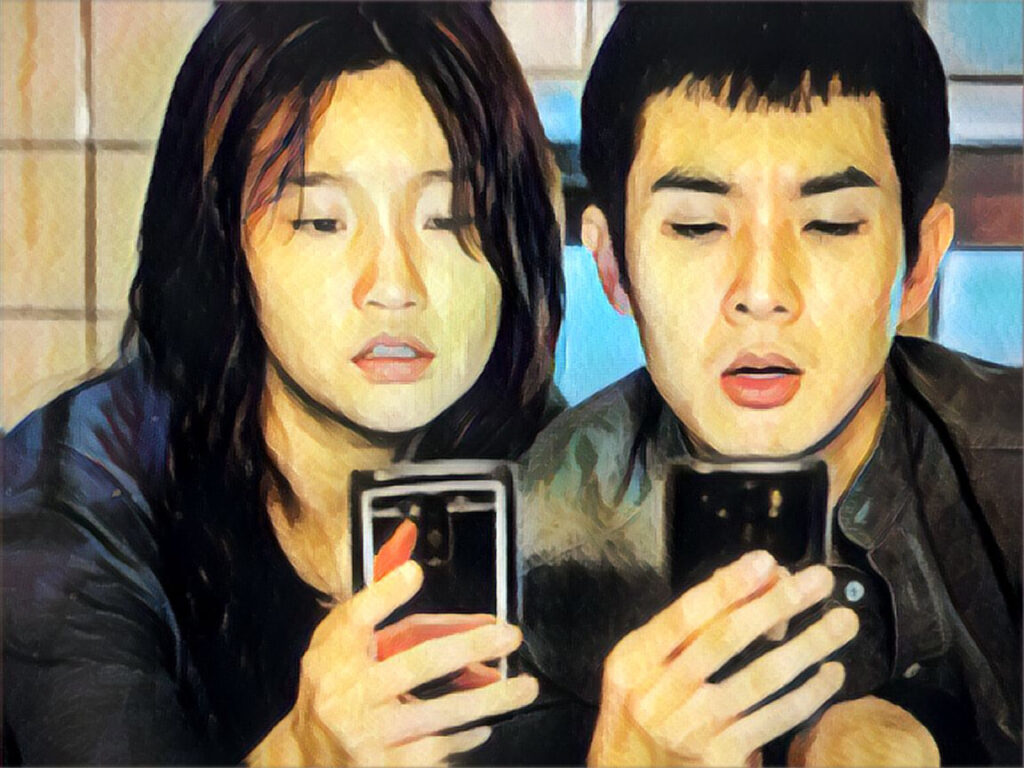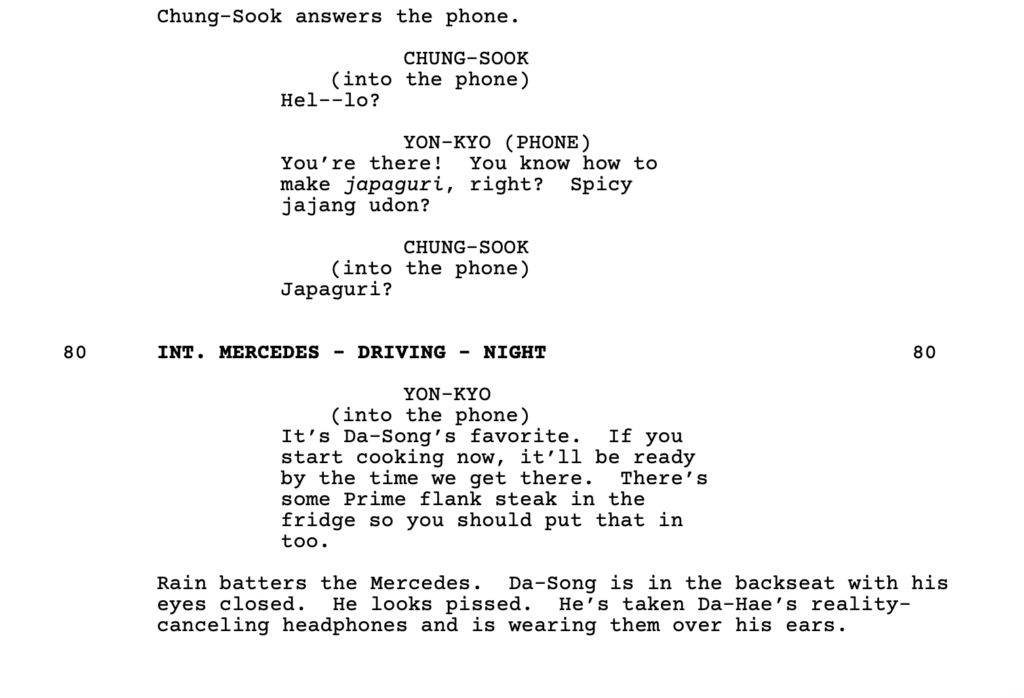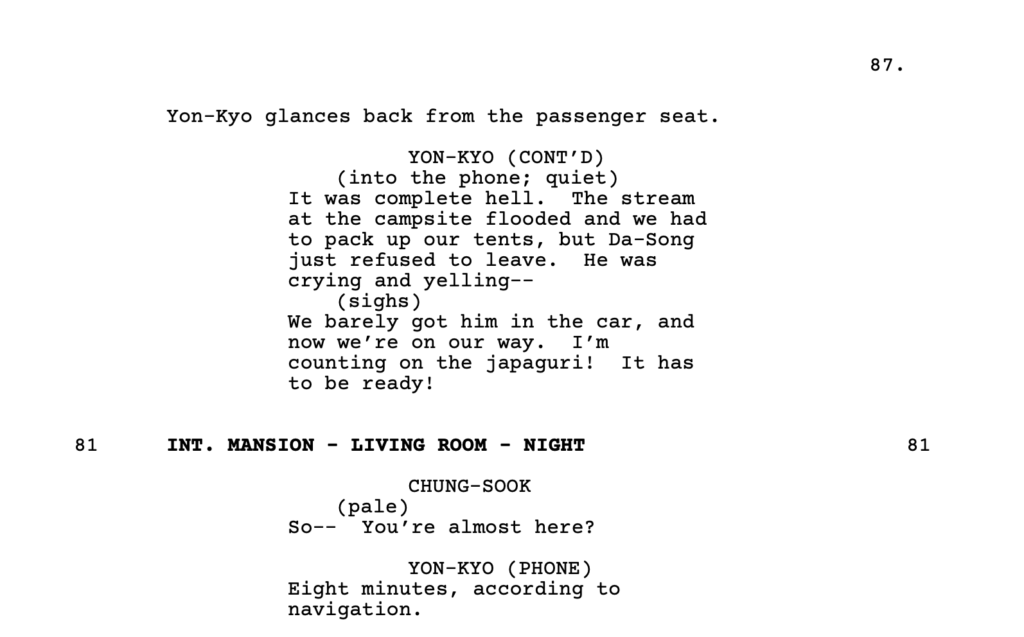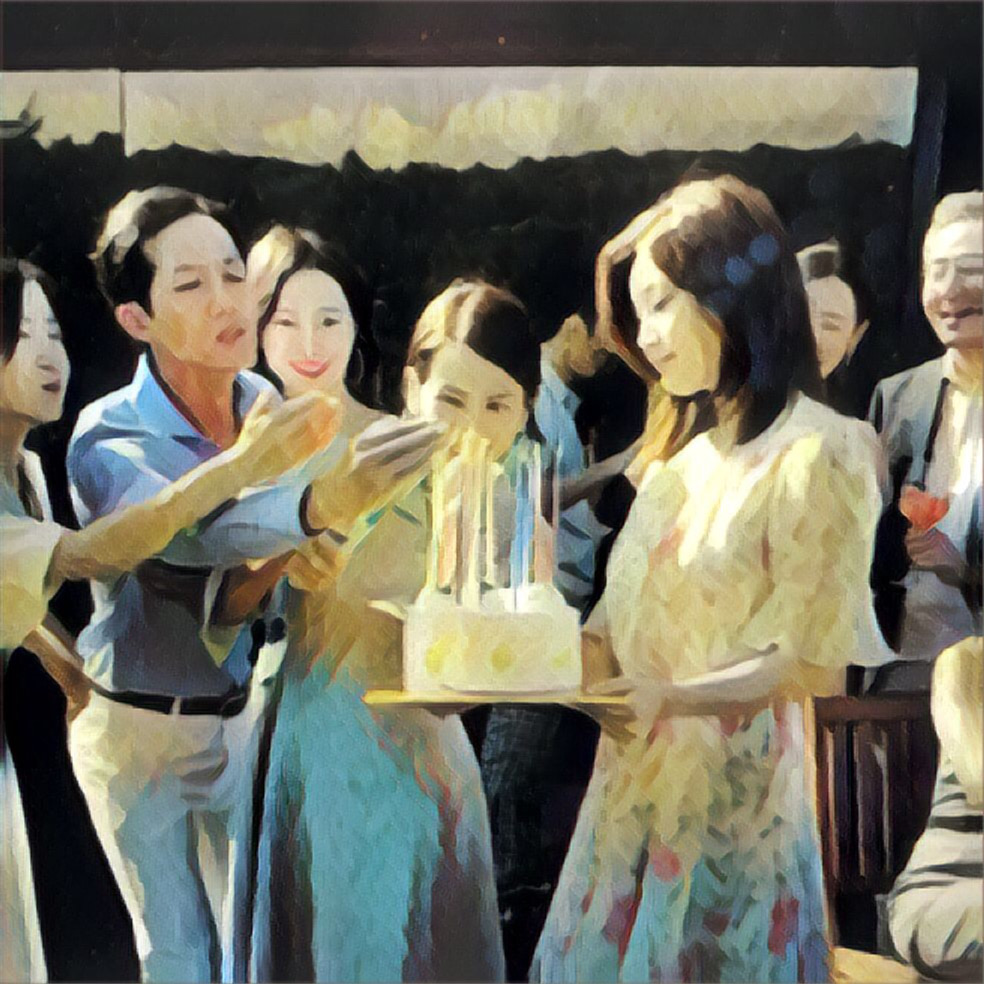Logline of Parasite: Greed and class discrimination threaten the newly formed symbiotic relationship between the wealthy Park family and the destitute Kim clan.
Script Can Be Found Here
Summary of Parasite:
Parasite begins with the Kims, a destitute family of scam artists who live in a Seoul basement. Father Kim Ki-taek/Mr. Kim (Song Kang-ho), mother Chung Sook (Jang Hye-jin), brother Ki-Woo/Kevin (Choi Woo-Shik), and sister Ki-Jung/Jessica (Park So-Dam) work a variety of low-income jobs (like folding pizza boxes) as they struggle for money. Min-hyuk (Park Seo-joon), a college student, drops by to give the family the gift of a Scholar’s Rock intended to promise wealth and suggests that Ki-Woo take over his job as an English language tutor for Da-hae (Jung Ji-so), daughter of the wealthy Park family. Ki-Woo accepts the challenge and has his sister create some forged documents attesting that he is a Yonsei University student. He is hired by the Parks.
As Ki-Woo (as Kevin) begins his tutelage with Da-hae, he convinces the naive Park family matriarch Yon-Kyo (Cho Yeo-Jeong) Ki-Jung (Jessica) as an art therapist for young and troubled Da-Song (Jung Hyeon-jun). With Ki-Woo and Ki-Jung now as employees of the Park family, the next move by the Kims is to replace Driver Yun with father Ki-Tek; Ki-Jung does this by placing a pair of her panties in the car for patriarch Park Dong-ik (Lee Sun-Kyun) to find. Upon this discovery, Dong-ik fires Driver Yun and, per Ki-Jung’s recommendation, hires Ki-Tek as the new driver. To replace the Parks’ longtime housekeeper Mun-Kwang (Lee Jung-eun), who seems to be inherited from the previous owner, they exploit her peach allergy and cause Yon-Kyo to believe that she has tuberculosis. Meanwhile, Ki-Woo also starts a secret romantic relationship with Da-hae.
When the Park family takes a camping trip, all four of the Kims secretly stay in the house. Mun-Kwang appears in the rain and tells Chung-Sook that she left something in the basement. Chung-Sook reluctantly lets her in; Mun-Kwang opens a hidden entrance to an underground bunker that was created by the previous architect homeowner who neglected to inform the Parks of its existence. Chung-Sook learns that Mun-Kwang’s husband, Kun-Sae (Park Myung-hoon) has been living there in an effort to dodge loan sharks who have been hounding him for a failed business; we also learn that he is the “ghost” Da-Song saw one night. When Chung-Sook refuses Mun-Kwang’s pleas to allow them to remain in the bunker, the other Kims accidentally out themselves as eavesdroppers. Putting it together that all four of them are related, Mun-Kwang starts videoing them on her phone and threatens to expose them to the Parks. To keep them silenced, Mun-Kwang and her husband keep the Kims in uncomfortable poses upstairs while they reminisce about the times he would come upstairs surreptitiously, living out the fantasies that they lived there. Their reminiscing is cut short when the Kims attack the two and vie for their phones. All of them fight.
The Parks call and say that they are returning early due to a severe rainstorm. In a flash, the Kims tie up Mun-Kwang and Kun-Sae and hide them in the bunker before hastily cleaning up and preparing a meal of Ram-don. As the Park family comes home, Chung-Sook kicks Mun-Kwang down the stairs and knocks her unconscious. As Ki-Tek drags her body out of sight, he discovers that Kun-Sae is banging his head against a red button, emitting a type of twisted and violent thank-you message via Morse Code to Mr. Park; he explains to Ki-Tek that he does this every day – as his hands are tied behind him, he seems to have no choice but to do it with his head. Meanwhile, Mrs. Park explains to Chung-Sook why Dae-Song has issues; unbeknownst to him, he once saw Kun-Sae come up for food, and it traumatized him. After Ki-Tek finishes tying both of them up, he seals the bunker again and takes refuge with Ki-Jung and Ki-Woo underneath the living room table. Making matters more complicated is that Da-Song wants to camp out in the backyard with the Parks watching him from the living room couch. Ki-Tek, Ki-Woo, and Ki-Jun overhear Mr. and Mrs. Park have sex and Mr. Park complain about Ki-Tek’s odor. Eventually, the three are able to escape, but torrential rains have flooded their apartment with sewer water. They take shelter in a gymnasium with other displaced people.
The next day, Mrs. Park decides to host a garden party for Da-Song and invites all of the Kims either to help them (i.e., Mr. and Mrs. Kim) or attend as guests (Ki-Woo and Ki-Jun). As the guests arrive, Ki-Woo and Da-hae secretly make out. He stops and notes his discomfort to Da-hae at being at such a party. He excuses himself to go down to the bunker (with the Scholar’s Rock that he presumably brought with him from the refugee site). Meanwhile, Mr. Park and Ki-Woo rehearse in Native American garb that they’re going to pretend to kill Jessica with a tomahawk dance and that Da-Song will rescue them. Ki-Tek seems apprehensive, but Mr. Park talks him into it. Meanwhile, Ki-Jung and Chung-Sook talk, and almost goes downstairs to bring them food when Mrs. Park recruits her to act in the cake ritual.
Ki-Woo enters the bunker with his Scholar’s Rock to kill Kun-Sae and Mun-Kwang, accidentally dropping it down the stairs. After finding that Mun-Kwang is dead, Ki-Woo is attacked by Kun-Sae. A struggle ensues with Kun-Sae dropping the scholar’s rock on top of Ki-Woo, causing blood to pool everywhere. With the door to the upstairs open, Kun-Sae heads up to the garden party, grabs a kitchen knife, and mayhem ensues. As Jessica presents the cake, Kun-Sae runs out with a kitchen knife and stabs her in front of everyone, causing Da-Song to suffer another seizure. Kun-Sae and Chung-Sook fight with weapons until she fatally impales him with a barbecue skewer. As Ki-Tek tends to Ki-Jung, Mr. Park orders him to drive Da-Song to the hospital; in slow motion, he sees that Mr. Park is disgusted by the odor, which causes Ki-Tek to stab him with the knife and then flee.
Weeks later, Ki-Woo is recovering from brain surgery. Upon coming to, he recounts what happened: that he and Chung-Sook are convicted of fraud and put on probation, Ki-Jung died from her injuries and Ki-Tek disappeared. The media reported that Kun-Sae was a crazed homeless man and that his motives remain a mystery. Upon spying on his former home, now occupied by Germans, Ki-Woo sees a message in Morse code. He learns that Ki-Tek buried Mun-Kwang and, like Kun-Sae before him, Ki-Tek sneaks out at night to steal food from the kitchen. After burying the scholar’s rock in the river, Ki-Woo writes a letter back to Ki-Tek, saying that he’ll vow to earn enough money to buy the house and free him. In the end, he does that and embraces his father in the yard while his mother approaches them.

What Does Parasite Do Well?
Oh man.
I’m going to preface this by saying that, since my most recent deep dive was on Promising Young Woman, some of my analysis may reference that (both are Oscar-winning black comedic thrillers, and my consciousness is still kinda with that analysis. Bear with me).
Overall, Parasite follows a pretty straightforward and incredibly well-structured plot; it doesn’t rely on twisty plot gimmicks or devices. Rather its strength relies on its characters, its myriad of conflicts, and its overarching theme of class disparity.

That being said, here’s what it does astoundingly well:
- Reading the Room: Like Promising Young Woman, Parasite taps into one of the major narratives of the 21st century: the yawning disparity of wealth between the rich and the poor. Here, the Kims represent the formally-uneducated (but highly street smart) poor, and the Parks represent the formally-educated (but highly naive) ruling class. The only middle class that exists in this world are the positions that the Kims feign to occupy: a tutor, an art therapist, a housekeeper and a driver (but even then, are they really middle class?). In essence, Bong Joon Ho and Han Jin Won are presenting a mirror of a stratified culture in which the middle doesn’t exist, and the poor are left to fend for themselves (and against each other) in dire circumstances.
- Darkly Comedic Tone: What’s so powerful about Parasite is that, like Promising Young Woman, it taps into a widespread and pervasive rage, but it does so with a darkly funny tone. If we weren’t laughing so hard at the the Kim family’s cunning or Yon-Kyo’s stupidity, we’d be crying; for many people watching this film, living through such wealth inequality hits a bit too close to home. Counterbalancing rage with comedy makes the piece easier to digest (and, of course, enjoy).
- Upstairs/Downstairs: Continuing this theme is how the locations of these people indicate their class. As members of the lower class, the Kims occupy a Seoul cellar and the ground floor of the Park house; it’s rare that the members go upstairs in the house, but they venture down to the hidden underground basement that members of the lower-lower class (Kun-Sae and Mun-Kwang) occupy; of course, the Parks never even learn about this location let alone venture down there. Here’s the major kicker: permanently moving up or out is impossible. For instance, when Mun-Kwang appears from the cellar at the door to the kitchen before the Parks’ arrival, Chung-Sook swiftly knocks her downward to unconsciousness and death. When Kun-Sae finally comes out of the cellar, he flies into a murderous rage that culminates in his death. What I presume the filmmakers mean by all of this is the wealth disparity and the lack of upward mobility means societal dysfunction and death. BUT…
- Symbolism of the Scholar’s Rock…there is a slight glimmer of hope. These types of rocks, known as suseok became a fixture of Korean society during the Joseun dynasty when Confucian scholars placed them on writing tables. As a Scholar’s Rock, it’s presented to Ki-Woo by a college friend who wants him to tutor Da-Hae (note the presence of the theme of education as it serves as the entry point for the Kims’ invasion). While they believe that it has luck, we learn that that is not the case in that Kun-Sae weaponizes it against Ki-Woo’s head. After Ki-Woo’s miraculous recovery, he sets the stone in the stream and then vows to go to college so as to save up enough money to set his father free; again, the theme of education being the key to unlocking new possibilities is introduced. BUT – and this is where it gets weird – visually, it may imply that Ki-Woo eventually does that, but apparently, the song that plays over the end credits (that is sung by Ki-Woo) indicates that it takes him 500 years of manual labor to do so. Again, just like in the beginning, education may seem like the key to unlock possibilities for the Kims, but sadly, it doesn’t work that way for them.
- Animal Metaphor: (If you’ve been following the blog, you know I love a good animal metaphor in film – like here and here because writers/filmmakers often use their presence to highlight aspects of human nature. Parasite is no different). Here, the Kims are the obvious parasites because they come into the Park family secretly and feed off of their hosts (no wonder they are sprayed by the exterminator’s fluid at the film’s beginning and continue to smell badly for the rest of the film). But, when they discover that Kun-Sae lives below the Parks, they discover that they are not the only parasites here. In fact, much like pests infesting a home’s foundation in real life, the pests of Kun-Sae and Mun-Kwang seem to have been inherited from the previous owner and, in some ways, are feeding off of the Kims. The filmmaker is showing us that, among the parasites, there is a power structure BUT….
- Double Meaning of Title: …the hosts of these parasites, the Park family, are also parasites of the Kims. They may be paying the Kims to work, but towards the end, the Parks have the Kims perform work that has nothing to do with their original job descriptions (i.e., Chung-Sook has to plan a party with no notice, Ki-Tek and Jessica have to participate in the cake ritual, etc). Mrs. Park also seems wildly incompetent when it comes to basic household chores and responsibilities and therefore needs to lean heavily on domestic help to do so. This double meaning and role reversal makes for rich and dramatic relationships, but it also raises the important questions of, “Who takes more – the rich or the poor?” and “Who is the film’s main parasite?” Great art doesn’t answer questions; it merely raises them. Still, the murderous ending shows that, in this dystopian reality, the supposed symbiotic relationship among the relationships between parasites and hosts ends fatally.
- Unlikely Antagonist: What’s brilliant about Parasite is that the stakes keep rising for the Kims as they infiltrate the Park home. Once they take over the house (or the living areas at least), we wonder: where do we go from here? At the midpoint, when Mun-Kwang rings the doorbell, her request seems innocent enough, but we soon learn that no good deed goes unpunished in the world of Parasite. When she introduces Chung-Sook, and the Kims accidentally reveal themselves to be family, that’s when the narrative takes on a whole new twist. Now, the Kims have to battle Kun-Sae and Mun-Kwang for dominion, and then all of them have to keep their actions secret from the Parks. Kun-Sae didn’t exist as an antagonist at the narrative’s beginning, but there were details that were planted (i.e., Dae-Song’s portrait of him) that allowed his entrance to be integral to the plot. In doing so, the second half of Act Two and Act Three have tons of dramatic mileage that the filmmakers make complete use of. There’s no late-in-the-game plot sagging because a new (and integrated) character drives everyone to take new action.
- Integrated Details: Presenting details that are set-up and paid-off appropriately makes for a more satisfying audience experience because people like it when they notice something that’s a bit off and are later rewarded with an explanation. Upon first viewing the Dae-Song’s scribbled portrait of Kun-Sae, the audience doesn’t know who the portrait is of or why we’re seeing it (set-up). Once it becomes clear that the picture is of Kun-Sae during the strange encounter the two have (paid-off), there’s a new set-up, namely Dae-Song eating birthday cake on the floor of the kitchen; this leads to the thematic pay-off of Kun-Sae’s murderous rampage at Dae-Song’s birthday party during, you guessed it, the cake ceremony. Organic details like this that are woven into the plot ultimately create a bulletproof (and satisfying) narrative.
- Theme of Colonization: Although Parasite takes place in Korea, the families seem to have adopted certain motifs of colonization. Other than the ridiculousness of Ki-Woo and Ki-Jun adopting the respective names of Kevin and Jessica so to appear more Western to the Park family, the most prominent one is the Indian tee-pee that Dae-Song plays in (that, oddly, was made in the U.S. as we in the U.S. would’ve assumed something like that would’ve been made in Korea or China). Mr. Park and Mr. Kim dress up to enact a tomahawk fight and, finally, Yon-Kyo suggests that the arrangement of the tables should echo Korean battleships surrounding a Japanese ship in an obscure naval war. All of these motifs show how systems of oppression are as universal as they are local.
- Unique Weapons: What’s so amazing about Parasite is that, despite its violence, no one uses a gun. Instead, the weapons are psychological (i.e., preying on Yon-Kyo’s fears about Dae-Song, preying on the Parks’ obsession with appearances by planting Ki-Jun’s panties in the car), physical (i.e., using Mun-Kwang’s peach allergy against her), or technological (i.e., using a cellphone recording of the Kims as a type of weapon of truth that would blow their cover). Even Kun-Sae’s self-inflicted headbanging of Morse Code is creative in that he’s pledging his loyalty to the power-that-is while self-destructing. All of these show that the writers were willing to go deeper in their characters and circumstances to avoid cliches and find indelible solutions instead.
- This Dialogue Exchange: The dialogue in Parasite is consistently strong and funny, but there’s one minor line that Yon-Kyo said that sticks out. Here’s the exchange when she and her family are returning from the campfire:


What I really appreciate are two things: first, it paints a picture of the food. When dialogue makes observations, it allows more room for dramatinc subtext; second, and most important, it drags out the tension of what’s going on. The Kims, Mun-Kwang, and Kun-Sae are engaged in things they shouldn’t be doing.
Dragging out the tension here is like extending an elastic band back before letting go; it creates a huge amount of tension and suspense for the characters in the house (and us). Had Yon-Kyo started the conversation with “We’ll be home in eight minutes. Put on the food,” there would’ve been a flatter scene with less conflict.
12. The Ending: Much like Promising Young Woman and American Fiction, Parasite’s ending includes a type of post-script. Once the major action concludes for all three of these films, the last part of each exists as a type of epilogue. Here, until Ki-Woo discovers that his father is now sending messages of Morse Code from the basement (and he’s inherited Kun-Sae’s role), we don’t know what happened to him. There’s an element of mystery and suspense until Ki-Woo realizes what happened and enacts a plan. This is a unique twist ending that avoids all cliches, and, like American Fiction, gives a slight (yet debatable) hope that, in freeing his father, the Kims’ future won’t be like their past.
For all of Parasite’s incredible high points, I nevertheless found two things to be highly implausible: 1) that Ki-Woo would’ve survived Kun-Sae assaulting him in the head with the Scholar’s Rock (I mean, blood was covering the floor) and 2) that such a birthday party could be brought together on such short notice (especially if these families had younger kids). Still, these two points are forgivable compared to the rest of the cinematic awesomeness going on here. I’ll be thinking about (and rewatching) Parasite for years to come.
Open to your thoughts…

